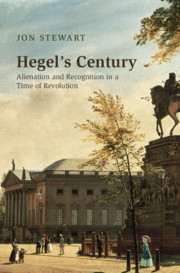Book contents
- Hegel’s Century
- Hegel’s Century
- Copyright page
- Dedication
- Contents
- Acknowledgments
- Preface
- Introduction
- Part I The Beginning
- Part II The First Generation
- Part III The Second Generation
- 6 Marx’s View of Religious and Political Liberation
- 7 Kierkegaard’s Analysis of the Forms of Despair and Alienation
- 8 Dostoevsky’s Criticism of Modern Rationalism and Materialism
- 9 Bakunin’s Theory of Anarchy
- 10 Engels’ Criticism of Feuerbach and Classical German Philosophy
- 11 Hegel’s Long Shadow in the History of Nineteenth-Century Philosophy
- Bibliography
- Index of Names
- Subject Index
9 - Bakunin’s Theory of Anarchy
from Part III - The Second Generation
Published online by Cambridge University Press: 14 October 2021
- Hegel’s Century
- Hegel’s Century
- Copyright page
- Dedication
- Contents
- Acknowledgments
- Preface
- Introduction
- Part I The Beginning
- Part II The First Generation
- Part III The Second Generation
- 6 Marx’s View of Religious and Political Liberation
- 7 Kierkegaard’s Analysis of the Forms of Despair and Alienation
- 8 Dostoevsky’s Criticism of Modern Rationalism and Materialism
- 9 Bakunin’s Theory of Anarchy
- 10 Engels’ Criticism of Feuerbach and Classical German Philosophy
- 11 Hegel’s Long Shadow in the History of Nineteenth-Century Philosophy
- Bibliography
- Index of Names
- Subject Index
Summary
Chapter 9 is concerned with the thought of the Russian anarchist thinker Mikhail Bakunin. In 1840 Bakunin traveled to Prussia and attended the University of Berlin. There he came into contact with some of Hegel’s leading students. The chapter begins with an analysis of his work God and the State. Like Hegel, he has recourse to the myth of the Fall in order to understand the fundamental shift from nature to spirit. But in contrast to Hegel, the important thing about the biblical account for Bakunin is the element of rebellion, which is essential for human freedom. A comparison is given of the criticism of religion found in Bauer and Bakunin, according to which humans must emancipate themselves from the belief in God in order to realize their own freedom. Bakunin also draws on Hegel’s theory of recognition and freedom. To be who we are, we need the recognition of others in society. An overview is provided of Bakunin’s criticism of Hegel and his followers in Statism and Anarchy. Finally, Bakunin’s bitter polemic against his one-time friend Karl Marx is examined.
- Type
- Chapter
- Information
- Hegel's CenturyAlienation and Recognition in a Time of Revolution, pp. 229 - 257Publisher: Cambridge University PressPrint publication year: 2021



